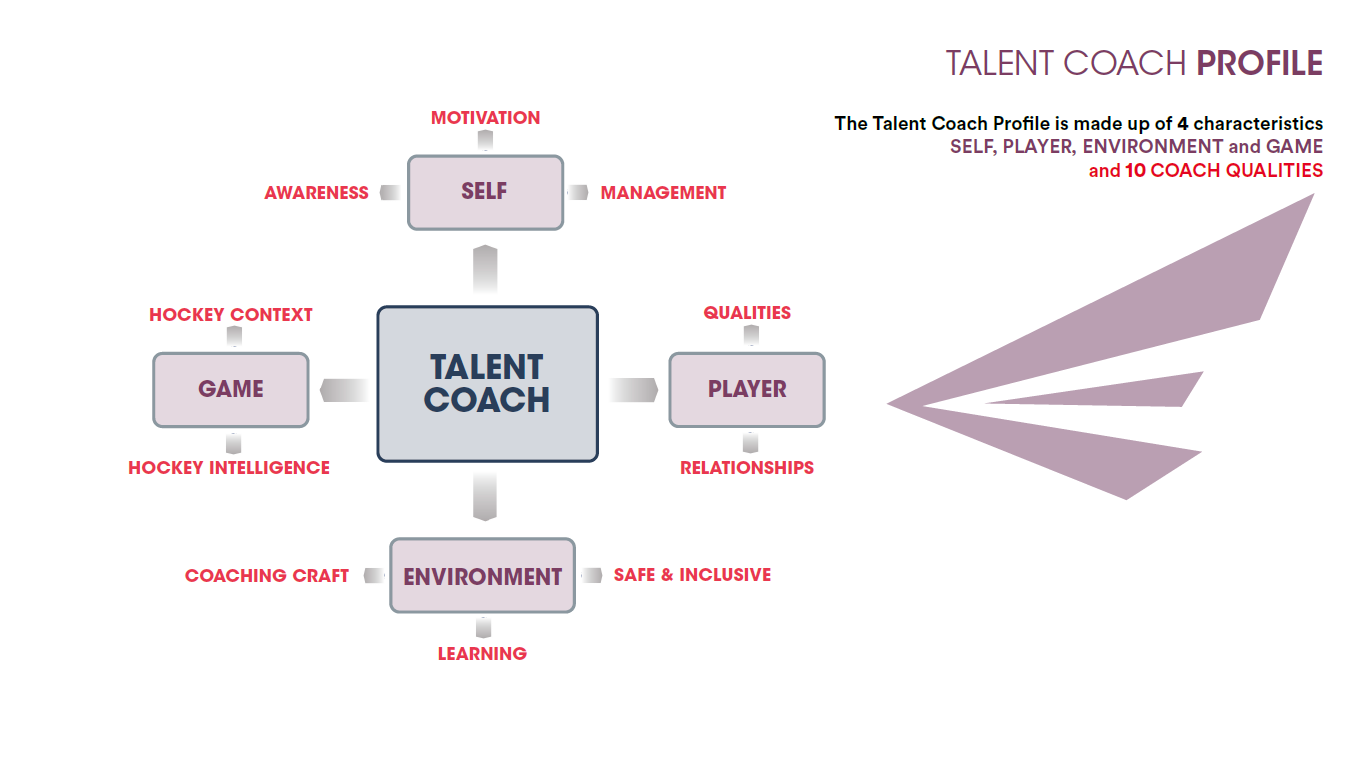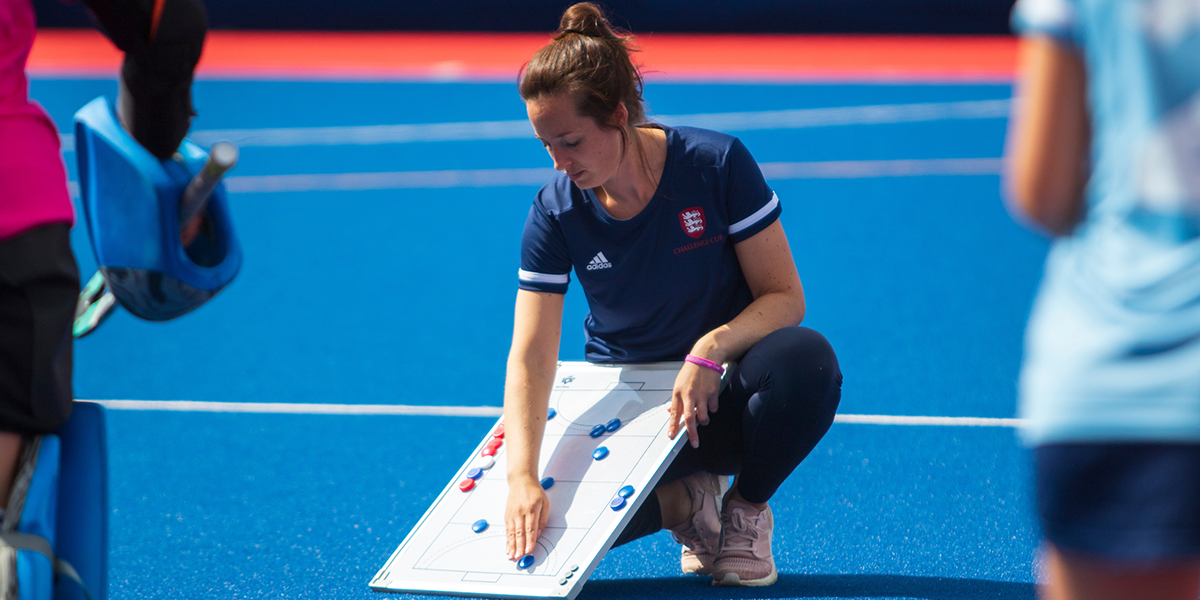Coaches and the environments they create are the foundations of talent development and a lifelong passion for the game. With the player at the heart of the Talent System, their coaches and the learning environments they create are inescapably linked. This is why coaching is one of the key priority areas within the Talent System.
Many of the Olympians that we ask “who was your most influential coach?” will always reply with a few names but one they never miss out is their main coach at the key developmental age between 11 and 18; and often their first coach that gave them passion for the sport. Their improvements at a young age are often dedicated to a great coach.
A great coach dedicates time and energy to individual improvement (alongside leading the team). They recognise the importance of individual connection and differentiation whilst ensuring the team ethos is always prominent. It is a clever and fine balance of developing both the individual and the team. Ultimately, hockey is a team sport made up of a group of individuals. A great coach recognises the importance of investing time in both. Player improvement takes time and as such the investment is not session by session but over a season or longer.
The ability of a coach to skilfully observe and intentionally interact with the players is the art of great coaching. To then review against those intentions by considering the effects of those interactions and the changes in the player will allow the coach to continually grow their coaching craft.
Historically, overt recommendations on the ‘How’ of coaching were at the forefront of our Talent Development guidance. We are now able to place the ‘What’ of coaching more explicitly at the forefront.
The Golden Thread is still one of the most valuable models to use when considering how to coach and is just as relevant when looking to coach Highly Skilled Actions and the techniques therein. The increased detail of what to coach is bound very tightly to an understanding of the Complete player qualities and the optimum learning environment which will all merge to create the optimum player experience at any stage of their development.
The role of the Coach is recognised as momentous and far-reaching across all aspects of the Talent System. They will be focused on the what as well as the how and will need to relentlessly consider the hockey context of the players they are trying to help. This will be demonstrated in their efforts to evaluate and understand their players against the Complete Player Qualities and the Hockey Experience Model. Coaches will use this to ensure their players can thrive and are able to access the optimum environment for their age, stage and needs so that they have an excellent hockey experience.
The role of the Coach in developing themselves, their craft, supporting the player, creating outstanding environments and being a student of the game is of immeasurable importance and is why we have developed a Talent Coach Profile.

-
Coaches who know themselves and why they coach, striving to continually develop and improve.
SELF AWARENESS
A coach can reflect on themselves and their coaching practice, behaviours and actions and the impact they have on others A coach can clearly articulate their roles and responsibilities to the environment and players they are working with.
SELF MOTIVATION
A coach can articulate their coaching philosophy, that guides their coaching practice, behaviours and actions. A coach is curious and open to learning to develop themselves and their coaching practice based on the needs of the players.
SELF MANAGEMENT
A coach who manages their own personal health and wellbeing, so they can consistently be their best to help others.
-
Coaches who develop their knowledge and understanding of hockey appropriate to the participant need.
HOCKEY INTELLIGENCE
A coach has robust knowledge of game understanding (Principles, Phases, Tactics, Context and Structure) and can apply in their coaching craft and practice.
A coach has robust knowledge of the Highly Skilled Actions and can apply in their coaching craft and practice.
A coach is able to deal with the varying game trends, rule changes and how it may impact on their coaching environment
A coach can demonstrate how they link practice to competition and utilise available technology to develop game understanding and skill acquisition
HOCKEY CONTEXT
A coach can support successful transition in and out of talent environments to support individual players development and lifelong participation
-
Coaches who build effective and sustainable relationships, with and around the player, to support their needs.
COMPLETE PLAYER QUALITIES
A coach can articulate ‘What is Talent’ and the core Talent Principles.
A coach has robust knowledge of the Complete Player Qualities.
A coach has knowledge of talent identification and profiling to determine a player's Individual Development Plan.
COACH-PLAYER RELATIONSHIPS
A coach can guide and support players needs for holistic development, making better people on and off the field.
A coach can build effective and appropriate relationships with a range of stakeholders to support them in line with agreed development and performance goals.
-
Coaches who are architects of environments that optimise learning, where players feel valued and actively participate in their own development.
EFFECTIVE LEARNING ENVIRONMENTS
A coach can create positive learning environments for players to thrive, develop and perform in, towards reaching their potential.
COACHING CRAFT AND PRACTICE
A coach can integrate different coaching approaches in their environment, justifying their effectiveness that support the development and performance of individual players and teams
SAFE AND INCLUSIVE ENVIRONMENT
A coach can deliver a learning environment which recognises and promotes diversity, encourages challenge, enjoyment and achievement.
A coach who performs their duties in an ethically responsible way, always play by the rules and protect the integrity of the sport.
How Can We Use The Talent Coach Profile?
In creating a healthy talent environment, along with the key building blocks of coherent and consistent messages, player centred focus, long-term aims and individual development, alignment with the elements of a strong motivational climate is imperative.
- The profile can be used by coaches for self-evaluation; it can aid coaches in their understanding of the areas they need to focus on for their development. These needs, once identified, can be scoped out against any support that might be required within the Talent Environment.
- The profile should be the tool that is used to create the coach’s learning and development plan.
- The profile can help identify excellent practitioners and may be used as a recruitment tool.
- The profile can be used by clubs, schools, and talent entities to evaluate the quality of provision being delivered in their environment. Not all coaches will be equipped with the complete range of qualities in the profile, but they may be present across multiple coaches to enable them to deliver an excellent learning environment.




